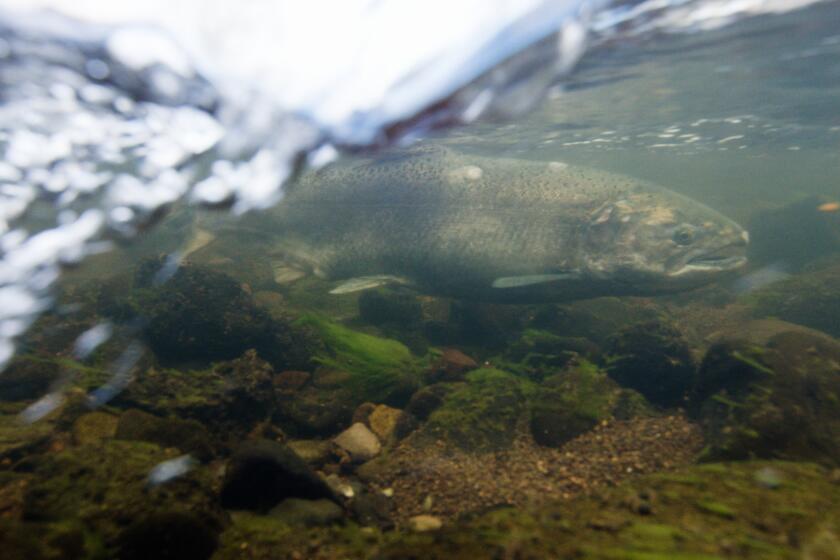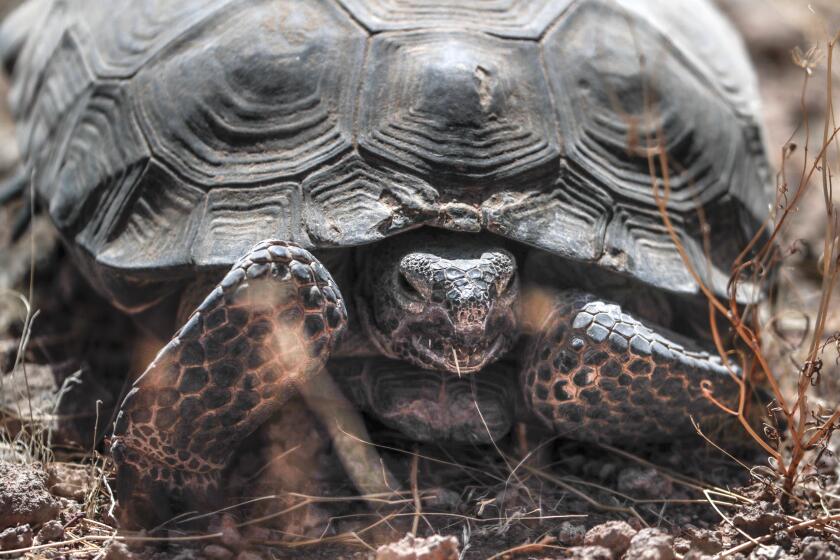Fur at Christmas Is Fashionable as Ever : People Love to Give Pets, but Some Bite Off More Than They Can Chew
Raindrops on roses and whiskers on kittens Bright copper kettles and warm woolen mittens Brown paper packages tied up with string These are a few of my favorite things “My Favorite Things,” Rogers and Hammerstein
Rogers and Hammerstein had a lot in common with Christmas shoppers. Except that many shoppers are skipping the copper kettles and warm woolen mittens and going directly to the kittens--or the dogs, horses or birds.
Pets are always high on Christmas wish lists, and, although humane societies, animal rights groups and most others concerned with the fate of pets advise against impulse buying, shoppers have been at it, putting schnauzers on layaway at local pet shops, wandering the aisles at the pound and answering classified ads in the newspaper.
SAN
DIEGO
COUNTY
“They’re just so cute and irresistible,” said Patti Saunders, who advertised the sale of her “absolutely gorgeous, very wrinkled” Chinese Shar Pei pups. “I started with six and only have two left. Dogs of this caliber sell fast because they’re always in demand. They’re clear of any medical problems, meaning lines are clear genetically--they are purebreds.”
Saunders’ 12-week-old pups sell for $800 to $3,000, depending on their genes.
“Some litters come out better than others,” Saunders said. “Some dogs will be show quality and others pet quality, but they’re all excellent house pets. When I sell my pups, I try to make sure they’ll be going to a good home. That’s more important than the money.”
Saunders, who has been breeding Shar Peis for three years, said planning for pups during the Christmas holiday is not an easy thing to do.
They Have to Be Ready
“Of course, it depends on your female adult dogs,” she said. “They have to be ready at the right time, and that’s something that can’t be predicted--sometimes the time is right, but the dogs aren’t in the mood. I just got lucky this time.”
Another in-home dog breeder, Penny McAvoy, sold all six of her 9-week-old Shih Tzu puppies shortly after running an ad. Males went for $200 each and females for more.
“I sold most of my puppies to elderly or retired people this time around,” McAvoy said. “I don’t do this every year; it depends on how I feel and how the dogs feel. Breeding takes a lot of time and patience; it can be real tiring at times, so I just let nature take its course.”
A nine-year veteran of Shih Tzu breeding, McAvoy said she had several inquiries for the puppies even before they were born.
“I’m very choosy about whom I sell my puppies to,” she said. “I want them in a good environment around someone who will love them and care for them. Pets have been known for cheering up the elderly, and the elderly are usually people who want someone warm to hold and love.”
The Timing Is Difficult
Kitten sales have also increased during the holiday period, but, according to Brenda Toews, a Canadian who breeds Persian cats, breeding for Christmas is difficult.
“The adult female cats have to be in heat in August in order to have the litter ready by the holidays,” she said. “Most of them go into heat during the spring, making for summer babies. This is the first time I bred my cats for Christmas kittens; I was lucky one of my females was ready and willing in August.”
Toews said some people breed specifically for the money. They own several animals that they breed three to four times a year, a practice that is frowned upon by animal associations, she said.
“Mass breeders are able to produce more holiday kittens and puppies, but you wonder about the quality and care of the animals,” Toews said. “Most of the offspring are kept in kennels from the time they are born and then sold to pet stores, where they are also kept in kennels.”
Holiday breeding of puppies and kittens may be tough, but horse breeders say that producing colts or fillies in time for Christmas is much more difficult and undesirable.
“A horse ages every new year,” said Jeanene Patterson, a quarter-horse owner. “If a colt of filly is born in December, it will turn a year old in January. Most horse owners and breeders try to produce offspring right after the new year.”
For racing purposes, a horse born shortly before the first of the year will be at a disadvantage; it will be less experienced and younger than its competitors that are strengthening with age, she said.
Although Christmas colts and fillies aren’t what horse breeders strive for, horses of all ages are frequently bought as gifts during the holiday season, said Patterson, who advertised the sale of four quarter horses during the past few weeks.
Easier to Fork It Over
“I have one filly left,” she said. “For some reason, it seems people don’t mind spending the money for a horse when it’s given as a Christmas gift. Horses are a little more expensive than other animals because of food and shelter. Even if (people have) planned on buying a horse a long time before, it’s easier to fork out the money during the holidays.”
Not only are people combing the want ads for that special Christmas pet, they’re bombarding local pet stores throughout the county.
Both Susan Pleiner, owner of Docktor Pet Centers in Fashion Valley and Parkway Plaza, and Dorothy Saffer, owner of Pups and Pets in El Cajon, said parents and children alike are packing their stores to view the doggies in the windows.
“We’ve been very busy this week,” Saffer said. “Sales are up, but that’s usual during the holidays. We have around 30 puppies--10 to 20 different breeds--but cockers and poodles seem to be selling the fastest.”
Although both women said they sell a number of puppies at Christmas time, they said it is not a good idea to take the animals home Christmas Day.
“Some people take them home a couple weeks before or after Christmas,” Pleiner said. “This gives the animal a chance to get used to its surroundings without all the commotion that takes place on Christmas Day.”
Both Should Be Happy
She and Saffer said they try to make sure the puppies will be going to a good home by asking the buyer several questions before the sale.
“You can’t very well place a German shepherd in an apartment or sneak a puppy into a place where animals are forbidden,” Saffer said. “Sometimes I get people who say their landlord doesn’t allow pets, but they want one anyway. In those cases, I try to talk them out of it, and they usually agree. I want to be sure that both animal and owner will be comfortable.”
After the remnants of paper and ribbon are thrown away, the reality of caring for the irresistible fluffs of fur sets in. They may become yelping, yapping, urinating demons of destruction. At the first sign of teeth marks on your 18th-Century armoire or the absence of your new leather shoe, you may have second thoughts about owning a pet.
But pets, who come with batteries that are slow to wear down, are not as easy to exchange as a sweater that doesn’t fit.
“People don’t realize the time it takes to care for an animal,” said Larry Boersma, a spokesman for the San Diego Humane Society. “For the past three years, we have seen an influx of animals right after Christmas--many of which were given as gifts.”
Sometimes the person who receive the pet really didn’t want one, or wanted a different breed. Other times the animal’s temperament is bad, or it becomes ill. But the most basic reason Boersma said he hears is, “I just don’t have the time.”
Chance to Fall in Love
“That’s why we sell gift certificates,” he said. “This way the pet can be chosen by the person whom it will live with. It gives them a chance to fall in love. There has to be that chemistry or it just doesn’t work. You want to adopt the pet to someone who really wants one.”
Gift certificates also give people time to look over animals at their convenience, after the Christmas chaos. Boersma said he sees very few returns when gift certificates are used.
“It’s really important that people realize the shock the animal goes through when being rejected,” he said. “They look so sad. . . . You have to take into consideration that this animal has been separated from their mother and then from its new owner. It’s been rejected twice, and believe me, they know it.”
Although many Christmas discards end up in the Humane Society shelter, Boersma said, the adoption turnover rate is 99%, and animals are allowed to stay as long as necessary. Dogs are taken on walks as often as possible, and close care and nurturing help the animals get over their rejection, he said.
The endings are not as happy at the San Diego Department of Animal Control. Hector Cazares, assistant director of the shelter, said literally hundreds of dogs are dropped off or picked up after Christmas.
“We do have adoption and work very hard to find our animals a home,” Cazares said. “But our incoming number well exceeds the outgoing. It’s real sad to see so many unwanted and abandoned animals.”
Many Put to Sleep
Because of the crowded conditions, the shelter can harbor cats for only 72 hours and dogs for three working days, or five days if they are licensed. After that, the animals are put up for adoption. If that is unsuccessful, they are put to sleep. Cazares said 23,000 dogs were put to sleep last year.
“That’s why we tend to dissuade people from buying a pet as a holiday gift,” he said. “They have to know what they’re getting into. You don’t just drop that responsibility into someone’s lap; animal and owner should meet one another first.”
The animal control department also provides gift certificates and encourages having males neutered and females spayed immediately.
“Once the novelty of a new pet wears off, so do temperaments,” Cazares said. “We see a lot of abused and neglected animals. We strongly suggest letting the owner or person getting the pet pick it out and make sure they understand the dedication it takes to care for it.”



